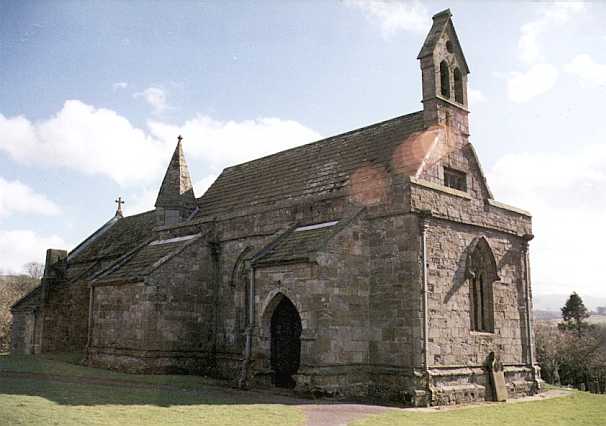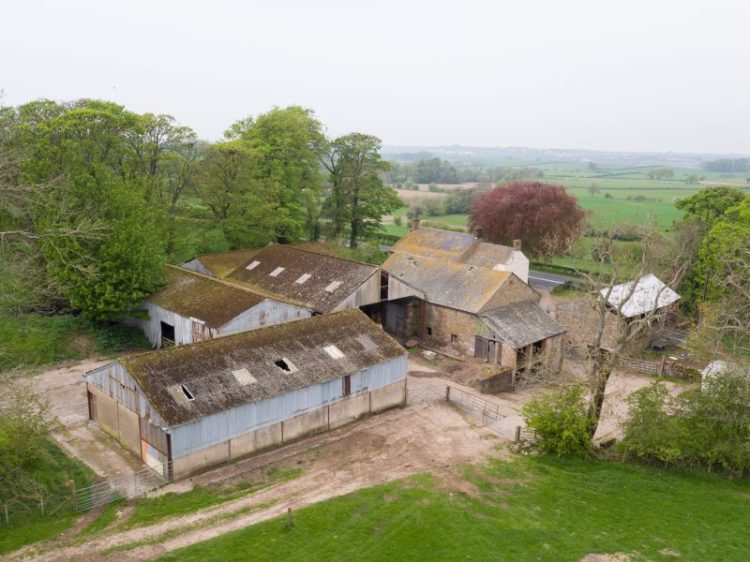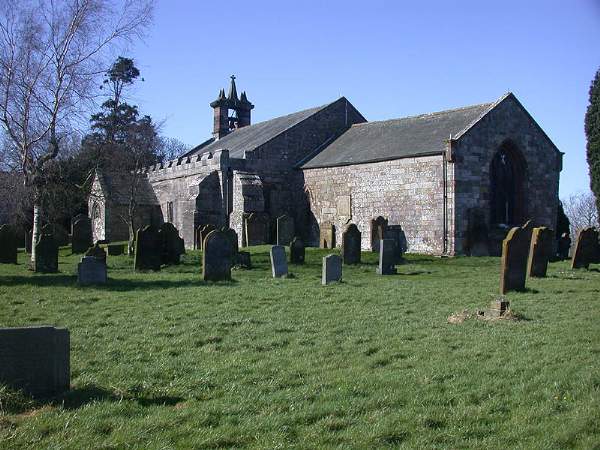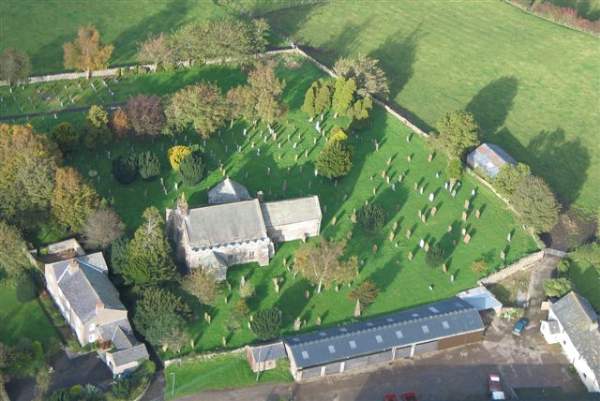Thomas Moore - Born 27th Jan 1802 Died15th March 1883 - was George Moore's older brother.
Thomas Moore was buried at Bolton Gate Church

Thomas Moore's Brief Obituary
DEATH OF MR THOMAS MOORE - The death of Mr. Thomas Moore, of Mealsgate, yesterday, removes a Cumberland statesman of a class that is fast disappearing. He was the elder brother of the late Mr. George Moore, and possessed in a high degree the active energy which won for that well-known "Cumberland Worthy" his high position in the mercantile world. Thomas was, however, in many ways a man of a very different stamp. He had not the ambitious spirit of George, and was content to plod all his life upon the patrimonial estate at Mealsgate, where he worked early and late. Indeed, at times he contemplated with amazement the gigantic commercial operations of his brother, whose great prosperity he could hardly fully understand. A quiet unassuming manner covered much shrewdness and a sense of humour, and such was his natural kindness of disposition that he would any day walk twenty or thirty miles to do a good turn to a friend. Mr Moore who was in his 82nd year, moved about actively in the pursuit of his daily avocations until a short time ago, when a severe cold laid him up, and the effects of it he was never able to shake off.
Thomas Moore's Lengthy Obituary entitled
THE LAST OF THE MOORES OF OVERGATES*
Thomas Moore of Mealsgate, who died on Thursday last of bronchitis, at the age of 81, and was buried at Bolton Gate yesterday, was a good type of a class of men who are, unfortunately, fast disappearing from among us, but who in their day have done much to establish that reputation for industry, independence, and plainness of speech which is so characteristic of the true Cumbrian. His life seems to deserve extensive notice, not only because he was a well-known figure in the district in which he resided, but the fact that with him closes the long list of Moores who have been “statesmen” of Overgates and Mealsgate for many generations. From well-known causes the statesman or yeoman class - men who lived by and on their own lands - has well-nigh died out in England; and it is therefore matter of regret that one more relic of the class has passed away from Cumberland. It was specially interesting in our time to meet a man who for 81 years had continued to live “at the old spot” and by his very eccentricities - for he had a very strongly marked individuality, - was a fine specimen of the old “Greycoat” of the north country.
Thomas Moore was born January 27th , 1802, and was the eldest son of John Moore, whose father had bought Mealsgate land in 1773 , he being the younger son of the Moore of Overgates. Thomas Moore lived the same life , managed his land in the same way, and adhered to the old habits and customs even with his household, as far as was possible, as his fore-elders had done before him. He revered his father’s memory, and, even to the last days of his life, would quote his father’s opinions, and what his father did, as the reason for anything he was doing, - although old John Moore had been dead for more than forty years. His whole life was one of simple but regular routine, and habits that he had been taught in his youth, inheriting them no doubt from former generations, he kept up to the last. For instance, on Sundays he never omitted, whoever was present, reading aloud to his servants, before the mid-day meal, which he shared with them, the whole of the Psalm or the chapter, however long, from which the text of the sermon had been taken,- this having been his father’s custom in foregone years. There was an air of primitive simplicity about every part of his old farmhouse at Mealsgate, and on entering it you might readily imagine how things must have looked 100 years ago. No restoration, no additions, no alterations, except the insertion of some larger window panes, had ever been permitted. The outer gate led into a yard, which sloped upwards to the house, and was always allowed to remain in pretty much the same condition that it had been in when Thomas inherited it. We have heard it said that when the posts of this outer gate had through age become broken and had fallen to one side, so that the gate could not be shut, his brother, George, without his knowledge, sent his bailiff with two new stone posts, which were put in the place of the old ones. But such new-fangled arrangements were not altogether agreeable to the Greycoat’s old-fashioned ideas, and, accordingly when on his return from Wigton market he found the men at work, he incontinently ordered them off the premises. Then he made his own men take out the new posts and lay them on the ground. We believe, however, that he afterwards submitted, albeit unwillingly, to the necessary renovation, though he gave no thanks to his brother for “meddlin’ wi’ t’auld yate posts”. The yard in front of the house was always kept strewed with straw, and became litter for the cattle which were allowed to stand about in it, so that the approach to the front door often presented an appearance that could not have claimed a very favourable report from an Inspector of Nuisances. A low wall separated the yard from the narrow garden, only a few feet wide, which ran under the windows of the house; and here southernwood, sweetbriar, an undergrowth of mint, and old white rose bushes had struggled on and scattered their fragrance, though little tended for many a day. Inside the house the wide , uneven stone stair and low-ceilinged rooms, boarded with oak and provided with strong oaken doors, had out-lasted many a generation. Nothing of modern luxury met the eye, and it was easy to picture the lives of simple, careful toil and independence that had been led there.
In Thomas Moore’s early days, thrift was a real necessity for the statesman’s household. In the beginning of this century the taxes were at the highest, because of the war. He would sometimes tell that salt was then 8s a stone ; and we must remember that this article was an absolute necessity not only for the cattle, but for curing the bacon and the dried beef and hung mutton, which was the only luxury allowed to themselves by the farmers in winter. In these later days we can form little idea of the carefulness and toil and self-denial exercised from year’s end to year’s end by those who lived on the land of a small “estate”. The farm at Mealsgate had many calls upon it before Thomas came to man’s estate, and we have heard that had it not been for Thomas’s careful ways the land would have had to pass into other hands. This need of thrift from his earliest years strengthened in Thomas those provident ways which were a part of his nature, and which were his proverbial characteristic; for it was sometimes said of him in past years that “Tommy Moore would spare t’ smook off t’ kail pot!” He was the elder brother of George Moore, whose name has become a household word not only in Cumberland but wherever English is spoken: but the two brothers were as unlike in character as can possibly be imagined, - the one patient, plodding, and contented, the other restless, enterprising, and ambitious, - about the only characteristics which the two had in common being those of steadfastness of purpose, industry, and straightforwardness. There was, however, a warm attachment between them. Of each in his different ways of life it was said that “ he never backed out of his word”. Each brother also had a fearless way of expressing his convictions and of telling people to their faces, and not repeating behind their backs, what they liked or disliked about things. It was to be Thomas’s lot never to leave the old homestead., whilst George Moore’s life was to be full of varied experience and of romantic incident. Indeed, George’s rapid rise in commercial and social position used to fill the elder brother with as much alarm as astonishment, and for many years he used to openly express his belief that “our George would break, and that he would have to keep him from the work-house.” He was very doubtful also of the good results of George’s friendship “with a’ mak o’ gurt fwoke” who would come to the old homestead on the occasion of his brother’s autumn holidays. As time passed, he understood George Moore’s position better but he envied him none of it.
After his brother’s untimely death from the accident in Carlisle, Thomas did much in his own peculiar way to show his deep affection for him, and utilised the handsome legacy that he had bequeathed to him by giving large gifts to many charitable works, because he thought his brother would have liked him to do so. He largely contributed to the enlargement of AllHallows School to prevent it becoming a Board School. He subscribed annually to the needs of Christ Church, Somers Town, London, which had been built by his brother. He took a large share in the building of the George Moore Memorial Hall at Mealsgate, encouraged everything connected with it, and gave large gifts to many works, because he thought his brother would have wished him to do so. He was a strong Liberal in politics, though very conservative in his actions, and a staunch supporter of the Church and State. The increased fortune of his later years did not bring any change of dress or of habit into Thomas Moore’s life. His days were passed just as before - in his fields, at the markets, and among his old neighbours. He had to the last remarkable powers of walking. His brother once gave him a pony, but he soon sold it and said “his walking stick was the best nag,” and he would travel on foot immense distances, starting off early in the morning, without food, even when over 76 years of age. He disliked new fashions of any sort, and many will remember the sly humour with which, with a twinkle in his eye, he used to tell the story of the tea party he was at in his youth, some 60 years ago, at a place called The Close. These were his words: “They are a’ sitting roond,” he used to say, “wi’ their chairs agin t’ wa’, when twee sarvent lasses com in wi’ twee trays and cups and saucers, wi’ tea teumed out on yan tray, and bread and butter and cakes on t’ udder. We were a’ country naybors, and we scarce knew what to do, sae we sat still and did nowt, till we sud see what Dan Birkett wad do; as he was a young likely chap. When his turn com, he teuk t’ bread first, and when tea came roond he put t’ bread in his mooth; then he gat cup in his hand, and teumed tea into t’ saucer. Then when he’d gitten cup in ya hand, saucer in t’udder, and bread atween his teeth, he was bet - and the rest on us didn’t know what to do. After a bit some on us plucked up heart and sat down on t’ floor; other some set on their knees on t’ floor, and set their cups on chair bottom; some scalded theirselves; all would as soon have wanted it. Most thought it was newt but pride and French fashions; but I said ’I’ll never gang to another handed tea’, and I’ve kept my word.” Thomas Moore spoke in the true old Cumberland dialect, unchanged in the least by the speech of those around him. A favourite rhyme of his (though in adopting it he did make a little concession to modern good sense) was one contrasting the manners in farm houses now with those of his upbringing:-
Then it was
“Man to the plough,
Wife to the cow,
Girl to the sow,
Boy to the mow
And their rent would be netted”
Now it is
“Man tally ho!
Miss piano,
Wife silk and satin,
And you’ll be gazetted.”
Contentment appeared to be his rule of life. Even the vicissitudes of the weather, so often the cause of anxiety to his brother farmers, gave him no concern. “It is good enough for us” he would say, in response to any complaint. Death, again, had no fears for him. “The old must, and the young may go” was one of his familiar sayings.
His clothes, his manners, his tastes, to the last retained the simplicity of primitive times. The old residents and farmers had visits from him nearly every week, - and he kept this up to the end ; and he always a good neighbour, lending his horses and carts at any time “to help folk”, whenever help was needed. His wife (Sarah Wilkinson) died at the close of 1869, and soon after her death he had a tombstone erected in Bolton churchyard. He added the following inscription: -
“Farewell vain world, I’ve seen enough of thee,
And now am careless what thou say’st of me.
Thy smiles I court not, nor thy frowns I fear,
My cares are past, my head lies quiet here;
What faults you’ve seen in me take care to shun
And look at Home, enough there’s to be done.”
These characteristic lines were of course intended for himself, a blank space being left for his own name immediately above them. Now that his is gone, his familiar form will be missed both at church and market, as well as by his immediate neighbours, and for years to come changes in local habits and manners will often be illustrated by some reference to the characteristics of the last of the Moores of Overgates.
From this obituary, I infer that Thomas Moore had no children (as none are mentioned) and certainly no children who survived him.
* OVERGATES FARM was the ancestral home of the Moores. It is located in the parish of Torpenhow with its ancient church dedicated to St Michael. In the churchyard is to be found the resting place of many generations of the Old Moores, including the grave of Thomas Moore (born at Overgates in 1733), who was George Moore's grandfather. As a younger son Thomas Moore went to Bothel to assist his brother in the work of the farm. However, in 1773, aged 40 years, he went to Mealsgate where he purchased a farm of 60 acres in the parishes of Bolton & AllHallows. The farm in Mealsgate eventually passed from Thomas to his son John Moore who, with his wife Peggy Lowes, had five chlldren: Thomas Moore (born 27/01/1802) subject of the above obituary, Sarah (born 17/01/1804), George Moore (born 9/04/1806), Mary (born 5/03/1808) and William (born 30/03/1810).
George Moore's grandfather, Thomas Moore of Mealsgate lived to see all of his five grandchildren and when he died at the ripe old age of 78 years, he was laid to rest with his forefathers in the churchyard in Torpenhow.

Above :The Farm at Overgates in Torpenhow pictured in 2020
Below: The Church in Torpenhow


Torpenhow Church & churchyard. (Courtesy Simon Ledingham)